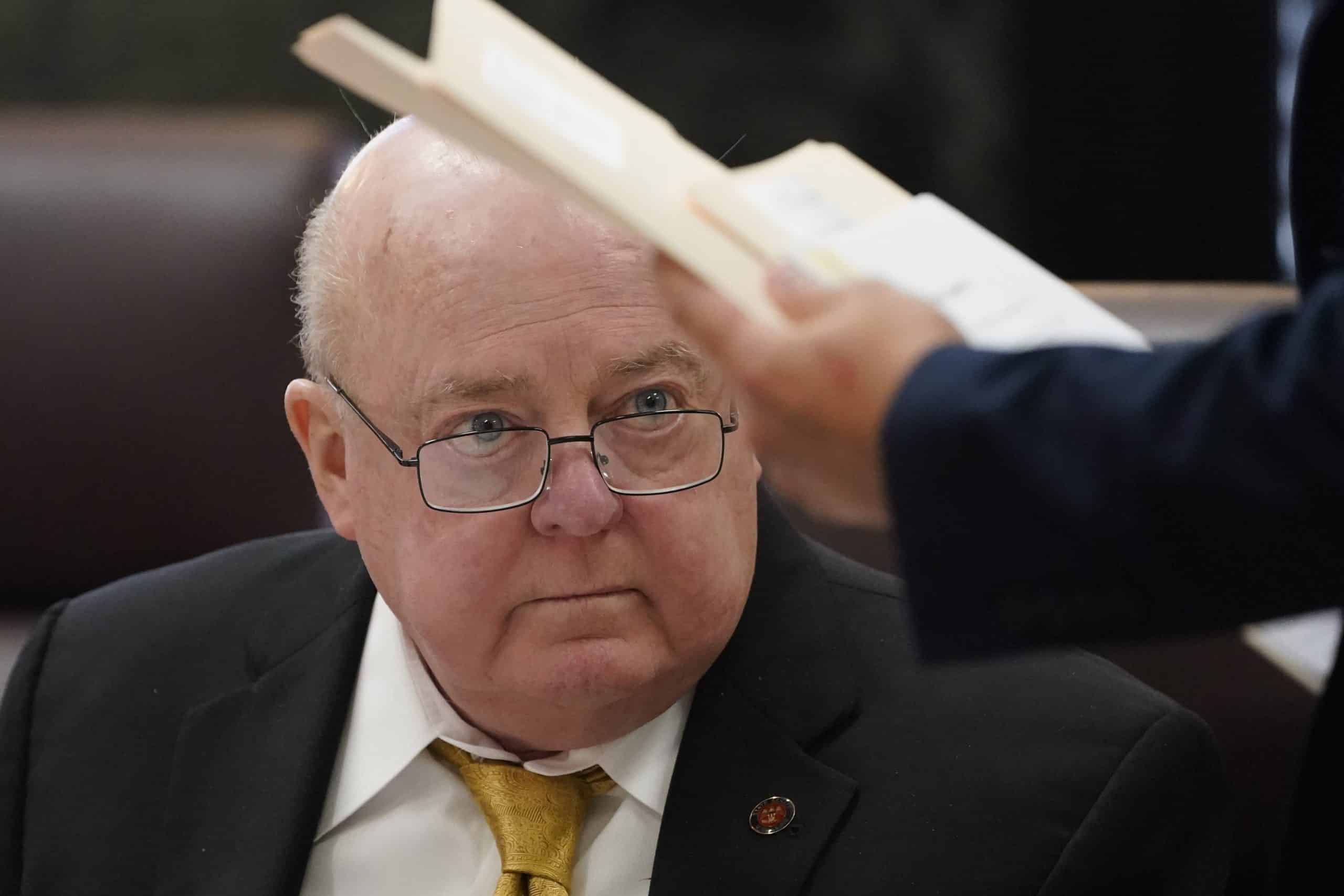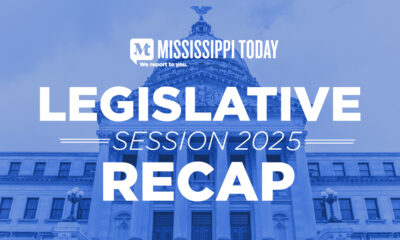Mississippi Today
Lawmaker behind bill to close three universities says its has ‘slim’ chance to pass

A lawmaker behind a controversial bill to close three public universities in Mississippi says its chances of becoming law this session are “slim.”
Sen. John Polk, R-Hattiesburg, told Mississippi Today that he just wanted to start a conversation when he filed Senate Bill 2726, which would require the governing board of Mississippi’s eight public universities to shutter three by 2028.
“It’s pretty out there,” Polk said.
Start a conversation, Polk did. Social media was a flurry the weekend after the bill dropped. By Wednesday, an online petition opposing the bill had gained more than 7,500 signatures. A local newspaper serving Columbus, the northeastern city home to Mississippi University for Women, published an op-ed warning the bill would devastate the local economy.
And alumni of the state’s three historically black universities and colleges decried the bill as a do-over of former Gov. Haley Barbour’s plan to merge those schools.
That isn’t his intention, Polk said. Any of the eight universities could be closed under his bill. And among the most vulnerable based on enrollment are three of the state’s regional colleges: MUW in Columbus, Delta State University in Cleveland and Mississippi Valley State University, a historically Black university in Itta Bena.
“If I were trying to close an HBCU, I would’ve put that in the bill,” Polk said.
The bill will likely die in the Senate Colleges and Universities Committee due to politics, Polk said, and the emotional ties that Mississippians have to their colleges. His bill is not on the committee’s agenda for Thursday.
Still, it comes at an inauspicious time for higher education in Mississippi as university officials are scrambling to contend with a dwindling number of high school graduates going to college, a trend that will hit the regional colleges the hardest. It also comes on the heels of a failed push this session to rename MUW, part of an effort to boost the college’s declining enrollment.
“You can see how changing the name of the W causes such angst,” Polk said. “This bill will cause much more, and I know that.”
A number of solutions have been offered to this problem. Sen. Nicole Boyd, R-Oxford, the chair of the Senate Colleges and Universities Committee, has introduced a bill that would create a legislative taskforce to study how the “enrollment cliff” will impact the state’s higher education system.
But Polk’s bill is the first to propose the state close universities instead of coming to their rescue.
“Sometimes you just have to pull the Band-Aid off the wound,” Polk said. “Until I introduced this bill, no one was talking about that.”
Polk said the bill was his idea and that he did not consult the 12-member Institutions of Higher Learning Board of Trustees before filing it. An IHL spokesperson said the board does not comment on pending legislation.
If passed, IHL would be required to decide which three schools to close after conducting statewide listening sessions and evaluate criteria such as enrollment data; tuition rates; economic impact; additional services such as medical, agricultural, engineering or research; and “any other special factors that the board believes the institution offers that cannot be easily replaced or replicated.”
Involving IHL, Polk said, seemed like a way to make this process less political than if the Legislature decided which three to close. But many universities in Mississippi have felt overlooked by the board at various points in their history. Nine of the 12 trustees are graduates of Mississippi’s three largest research universities. Some are high-dollar donors to Gov. Tate Reeves, and all are gubernatorial appointees.
“IHL has the best interest of the education of students in higher education settings in Mississippi, and they’re the ones that can make the best decision for all of Mississippi,” Polk said.
Though Polk says his bill will save taxpayer dollars, he does not envision it reducing the annual funding IHL receives. He referred to an IHL handout showing the appropriations each school received last year.
If IHL closed the three schools with the smallest enrollments — Delta State, Valley State and MUW — the state could save $85 million, Polk said, money he sees as better off distributed among the remaining five.
“If they didn’t choose the three I just mentioned, the savings to the state would be better,” Polk said.
What would happen to the towns around these smaller colleges, like Itta Bena, Cleveland and Columbus? Polk said that’s not why the state universities exist.
But he noted his bill would not permit the closed campuses to become branches of the remaining five. The buildings would have to be sold or repurposed, he said.
“Our universities have a mission,” Polk said. “We forget sometimes their mission is to educate in a higher form than K-12. It is not economic development.”
If the University of Southern Mississippi closed, Polk said he would say he’s sorry, “but that’s what IHL thinks is best for the state of Mississippi.”
This article first appeared on Mississippi Today and is republished here under a Creative Commons license.![]()
Mississippi Today
Trump order threatens funding for Miss. colleges, cultural centers
For nearly three decades, a little-known federal agency has provided millions of dollars in support and funding to Mississippi’s colleges and universities museums, to libraries and to cultural institutions, including the Margaret Walker and COFO Civil Rights Center at Jackson State University.
In 2011, the state’s largest historically Black university’s cultural center and museum, received a $48,000 grant from the Institute of Museum and Libraries Services. The grant paid for staff to travel and learn about the historical preservation work from larger museums and institutions across the country.
“That grant was my professional development,” Robert Luckett, director of the cultural center said. “It was so important and has been foundational for all of the work we’ve done at Jackson State for the last fifteen, sixteen years.”
But, Jackson State isn’t the only Mississippi college that has benefitted from funds from IMLS, and the federal agency has flowed millions of dollars in grants to the state.
In 2022, Mississippi State University received a $74,000 grant to fund its Office of Museum Services and a $50,000 grant from the American Rescue Plan for Museums and Libraries to train and hire students from underserved communities to assist with biological collection and conservation. That same year, Northwest Mississippi Community College received $33,000 from the agency to support a series of community engagement discussions for students around racial injustice, mental health and stress in the post COVID-19 pandemic.
In 2020, Hinds Community College Utica’s campus received a $101,000 grant from IMLS’s Museums Grants for African American History and Culture to establish an oral history project for Black rural Mississippians and provided technology and equipment to record stories for residents who couldn’t make it to the campus museum. The federal agency also awarded $500,000 to the University of Mississippi through its Save America’s Treasures program and in 2010 a $450,000 grant to its Modern Political Archives to preserve and digitize 3,800 audio and visual recordings.
The Margaret Walker Center, which houses oral histories, manuscripts, book collections and history archives of Black Mississippians, and operates as the Black Studies Institute for Jackson State University, has been a cornerstone of cultural development for students.
Now, with an executive order from President Donald Trump, which led the federal agency’s nearly 70 employees to be placed on administrative leave last week, the future of the Margaret Walker Center’s work remains unclear.
The move to shut down IMLS comes weeks after President Donald Trump signed an executive order to scale down six other federal agencies to “the minimum presence,” according to The Washington Post.
The agency’s funding, which is less than one percent of the federal budget, has dolled out millions of dollars to museums, libraries and institutions. But, in states like Mississippi, where access to traditional resources and support for cultural institutions may be near to none or nonexistent, the agency’s funding has been essential in providing tools to do important work, Luckett said.
Out of the eight full-time staff members at the cultural center, two staff and a graduate fellow who works to digitize the historical archives is funded by subgrants of IMLS through the Smithsonian Institute, another national cultural institution facing cuts by the Trump administration. These jobs on the digital humanities staff could be in jeopardy.
Earlier this year, Luckett said his team applied for another grant from IMLS to pay for their renovation project of Ayer Hall, the oldest building on Jackson State University’s campus and home to the Margaret Walker Center. The grant funding will provide support for staff to move its collections into a safe environment.
Luckett said the cultural center was supposed to be notified in June if they receive the grant. But, with the changes to the agency, he’s unsure of what comes next.
“We don’t have the funding to do this,” Luckett said. “We’ll be back to square one.”
Other cultural institutions and organizations across the state such as the Mississippi Humanities Council, which currently has 35 open subgrants to various state colleges and universities, were reeling after hearing a major defunding announcement.
In a late night email, the organization learned their grant through the National Endowment of Humanities had been terminated. The national organization has provided more than 400 grants in Mississippi, including colleges in the state.
Sweeping cuts at IMLS and the National Endowment of Humanities threaten the future of established museum and library programs at local colleges from panels, literary festivals, history tours, youth education workshops and other public programs.
“In [Mississippi] our greatest strength is our history and culture,” Stuart Rockoff, executive director of the Mississippi Humanities Council, said. “Our grants and our programs have helped highlight that especially in smaller towns and rural areas of our state.”
The state’s cultural organization doled out various grants to Mississippi’s public universities and colleges, including a $8,400 grant to the Margaret Walker Center last year, which held a panel discussion on local activism in reflection to Mississippi’s civil rights movement history.
Luckett said protecting the state’s historical collections and providing access to them are key components for the curriculum for students at Jackson State University to engage in scholarship and research.
“These skills are not politicized,” Luckett said. “These are important learning tools for any student of any discipline.”
While it’s easy to ignore the federal agency being closed, the outside impact that such a small agency has on the country is remarkable, Luckett added.
“These are public servants doing these jobs, who are committed and who aren’t willing to get rich,” Luckett said. “This assault on IMLS is something we should all be worried about.”
This article first appeared on Mississippi Today and is republished here under a Creative Commons Attribution-NoDerivatives 4.0 International License.![]()
The post Trump order threatens funding for Miss. colleges, cultural centers appeared first on mississippitoday.org
Mississippi Today
Mississippi lawmakers end 2025 session unable to agree (or even meet about) state budget: Legislative recap
Infighting between Mississippi’s Republican House and Senate legislative leaders reached DEFCON 4 as the 2025 legislative session sputtered to a close last week.
Lawmakers gaveled out unable to set a $7 billion state budget — their main job — or to even agree to negotiate. Gov. Tate Reeves will force them back into session sometime before the end of the fiscal year June 30. At a press conference last week, the governor assured he would do so but did not give a timetable, other than saying he plans to give lawmakers some time to cool off.
The crowning achievement of the 2025 session was passage of a tax overhaul bill a majority of legislators accidentally voted for because of errors in its math. House leaders and the governor nevertheless celebrated passage of the measure, which will phase out the state individual income tax over about 14 years, more quickly trim the sales tax on some groceries to 5% raise the tax on gasoline by 9 cents a gallon, then have automatic gas tax increases thereafter based on the cost of road construction.
The error in the Senate bill accidentally removed safeguards that chamber’s leadership wanted to ensure the income tax would be phased out only if the state sees robust economic growth and controls spending.
The rope-a-dope the House used with the Senate errors to pass the measure also stripped a safeguard House leaders had wanted: a 1.5 cents on the dollar increase in the state’s sales tax, which would have brought it to 8.5%. House leaders said such an increase was needed to offset cutting more than $2 billion from the state’s $7 billion general fund revenue by eliminating the income tax, and to ensure local governments would be kept whole.
Reeves was nonplussed about the flaws in the bill he signed into law (at one point denying there were errors in it) and called it “One big, beautiful bill,” borrowing a phrase from President Donald Trump.
Quote of the Week
“Quite frankly, I think it’s chicken shit what they did.” — Gov. Tate Reeves, at a press conference last week when asked his thoughts about the Senate rejecting his nomination of Cory Custer, Reeves’ deputy chief of staff, to serve as four-year term on the board of Mississippi Public Broadcasting.
Full Legislative Coverage
What happened (or didn’t) in the rancorous 2025 Mississippi Legislative session?
Mississippi Today’s political team unpacks the just ended — for now — legislative session, that crashed at the end with GOP lawmakers unable to pass a budget after much infighting among Republican leaders. The crowning achievement of the session, a tax overhaul bill, was passed by accident and full of major errors and omissions. Listen to the podcast.
Gov. Tate Reeves, legislative leaders tout tax cut, but for some, it could be a tax increase
Many of those retirees who do not pay an income tax under state law and other Mississippians as well will face a tax increase under this newly passed legislation touted by Reeves and others. Read the column.
Trump administration slashes education funding. Mississippi leaders and schools panic
Mississippi schools and the state education system are set to lose over $137 million in federal funds after the U.S. Department of Education halted access to pandemic-era grant money, state leaders said this week. Read the story.
Gov. Tate Reeves says he’ll call Mississippi lawmakers back in special session after they failed to set budget
Gov. Tate Reeves on Thursday said he will call lawmakers into a special session to adopt a budget before state agencies run out of money later in the summer and hinted he might force legislators to consider other measures. Read the story.
GOP-controlled Senate rejects governor’s pick for public broadcasting board. Reeves calls it ‘chicken s–t’
The Senate on Wednesday roundly rejected the nomination of Cory Custer, Reeves’ deputy chief of staff, to serve a four-year term on the board of directors of Mississippi Public Broadcasting, the statewide public radio and television network. Reeves reacted to the Senate’s vote on Thursday, calling it “chicken shit.” Read the story.
Early voting proposal killed on last day of Mississippi legislative session
Mississippi will remain one of only three states without no-excuse early voting or no-excuse absentee voting. Read the story.
Mississippi Legislature ends 2025 session without setting a budget over GOP infighting
The House on Wednesday voted to end what had become a futile legislative session without passing a budget to fund state government, for the first time in 16 years. The Senate is expected to do the same on Thursday. Read the story.
Mississippi Legislature approves DEI ban after heated debate
Mississippi lawmakers have reached an agreement to ban diversity, equity and inclusion programs and a list of “divisive concepts” from public schools across the state education system, following the lead of numerous other Republican-controlled states and President Donald Trump’s administration. Read the story.
Fear and loathing: Legislative session crashes with lawmakers unable to set a budget because of Republican infighting
Republican Lt. Gov. Delbert Hosemann and other Senate leaders on Saturday excoriated the Republican House leadership, after the House didn’t show up for what was supposed to be “conference weekend” to haggle out a $7 billion budget. Read the story.
‘We’ll go another year’ without relief: Pharmacy benefit manager reform likely dead
Hotly contested legislation that aimed to increase the transparency and regulation of pharmacy benefit managers appeared dead in the water Tuesday after a lawmaker challenged the bill for a rule violation. Read the story.
This article first appeared on Mississippi Today and is republished here under a Creative Commons Attribution-NoDerivatives 4.0 International License.
The post Mississippi lawmakers end 2025 session unable to agree (or even meet about) state budget: Legislative recap appeared first on mississippitoday.org
Mississippi Today
On this day in 1909, Matthew Henson reached the North Pole
April 6, 1909

Matthew Henson reached the North Pole, planting the American flag. Traveling with the Admiral Peary Expedition, Henson reportedly reached the North Pole almost 45 minutes before Peary and the rest of the men.
“As I stood there on top of the world and I thought of the hundreds of men who had lost their lives in the effort to reach it, I felt profoundly grateful that I had the honor of representing my race,” he said.
While some would later dispute whether the expedition had actually reached the North Pole, Henson’s journey seems no less amazing.
Born in Maryland to sharecropping parents who survived attacks by the KKK, he grew up working, becoming a cabin boy and sailing around the world.
After returning, he became a salesman at a clothing store in Washington, D.C., where he waited on a customer named Robert Peary. Pearywas so impressed with Henson and his tales of the sea that he hired him as his personal valet.
Henson joined Peary on a trip to Nicaragua. Impressed with Henson’s seamanship, Peary made Henson his “first man” on the expeditions that followed to the Arctic. When the expedition returned, Peary drew praise from the world while Henson’s contributions were ignored.
Over time, his work came to be recognized. In 1937, he became the first African-American life member of The Explorers Club. Seven years later, he received the Peary Polar Expedition Medal and was received at the White House by President Truman and later President Eisenhower.
“There can be no vision to the (person) the horizon of whose vision is limited by the bounds of self,” he said. “But the great things of the world, the great accomplishments of the world, have been achieved by (people with) … high ideals and … great visions. The path is not easy, the climb is rugged and hard, but the glory at the end is worthwhile.”
Henson died in 1955, and his body was re-interred with full military honors at Arlington National Cemetery. The U.S. Postal Service featured him on a stamp, and the U.S. Navy named a Pathfinder class ship after him. In 2000, the National Geographic Society awarded him the Hubbard Medal.
This article first appeared on Mississippi Today and is republished here under a Creative Commons Attribution-NoDerivatives 4.0 International License.![]()
-

 Mississippi Today6 days ago
Mississippi Today6 days agoPharmacy benefit manager reform likely dead
-

 News from the South - Alabama News Feed7 days ago
News from the South - Alabama News Feed7 days ago'I think everybody's concerned': Mercedes-Benz plant eyeing impact of imported vehicle tariffs
-

 News from the South - Florida News Feed6 days ago
News from the South - Florida News Feed6 days agoFlorida special election results: GOP keeps 2 U.S. House seats in Florida
-

 News from the South - South Carolina News Feed4 days ago
News from the South - South Carolina News Feed4 days agoSouth Carolina clinic loses funding due to federal changes to DEI mandates
-

 News from the South - Kentucky News Feed5 days ago
News from the South - Kentucky News Feed5 days ago3 killed in fiery Lexington crash temporarily shuts down portion of New Circle Road
-

 Mississippi Today6 days ago
Mississippi Today6 days agoRole reversal: Horhn celebrates commanding primary while his expected runoff challenger Mayor Lumumba’s party sours
-

 News from the South - Louisiana News Feed7 days ago
News from the South - Louisiana News Feed7 days agoMother turns son's tragedy into mental health mission
-

 News from the South - Alabama News Feed6 days ago
News from the South - Alabama News Feed6 days agoWill Alabama Lawmakers Cut Taxes on Overtime Pay or Groceries? | April 1, 2025 | News 19 at 6 p.m.

















































